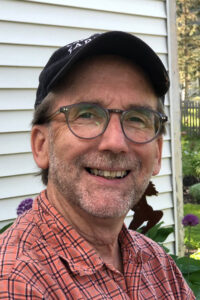
New STEM Ambassador Hire: Thomas Mullin
Maine EPSCoR has been proud to support UMaine Extension’s 4-H STEM Ambassador Program, which has proven to be widely successful over the past several years through the University of Maine System (UMS). According to the program’s website:
“4-H STEM Ambassadors are trained University of Maine students who facilitate hands-on science, technology, engineering, and math (STEM) activities with youth 8–14 years old throughout Maine. Through 4-H STEM Ambassadors, youth become connected to the research, resources, and scientists at Maine’s public universities.”
Due to the success of the program, organizers decided it would be of great benefit to expand the program beyond UMS and into community colleges. Thomas “Tom” Mullin, was hired as a 4-H Science Professional to advance the NSF EPSCoR RII Track-1 grant, Maine-eDNA, and help make this vision a reality.

Mullin brings more than 20 years of experience as an Associate Professor of Parks and Forest Resources at Unity College to the table, along with his passion for learning new things and sharing his knowledge with others.
“I still get excited about being at a job where I wake up every morning and get to learn something new,” Mullin says. “That’s the best type of job. You can’t beat it.”
According to Mullin, many community colleges in Maine have a deep connection to service learning and STEM education. He has worked to develop relationships with Southern Maine Community College (SMCC) and Kennebec Valley Community College (KVCC) with a plan to connect to others in order to pilot STEM Ambassador Program curriculum currently being developed.
“Our main goal right now is securing at least 1-2 professors per campus to embed the curriculum into their Fall 2021 semester. That would equate to approximately 100 aspirational Ambassadors,” Mullin explains.
Training and piloting of the curriculum, which will draw on information and discoveries relevant to the Maine-eDNA program and other disciplines of research, is currently in development, with plans of testing and further developing the curriculum in the summer. Mullin has been involved with a wide variety of meetings since he was hired in November 2020 in order to keep the program progressing despite COVID-19 restrictions.
“I believe in this program and its ability to impact the state and beyond,” Mullin states. “We may not see it immediately, but in 5-10 years, when a more diverse cohort of students who participated in the program gain confidence in choosing to pursue STEM degrees and occupations.”
